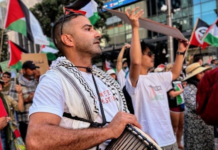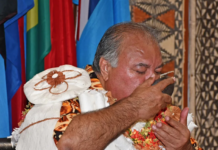On economic and social injustice (click here for part two of this series) I give money to street beggars (the visible sign of a broken political, economic and social system); lean towards the socialist edge of social democracy; marched in anti-TPPA protests; am pro trade unions and workers rights; desperately want affordable housing and a living wage for all – and I am a feminist. Like many others, I care about issues of economic and social (in)justice. There is a recurring argument made on social media (and sometimes mainstream media) that somehow I can’t be for all those things: that I am either active and/or vocal against our current system of economic injustice (an end to poverty and a too wide income and wealth gap), or I support “identity politics” (feminism, anti-racism, anti LGBTI or disability discrimination) – or worse, I am one of those now burdened with the clumsy label “identitarian”, with cult-like, right wing connotations. (See also the post on The Standard, “We are all ‘identitarian’ now”.) This is a label many detractors use to slap down those speaking against injustices that damage women, LGBTI people, people of colour, and many others. As with all social justice movements, feminists come in a range of political shapes and sizes. I can’t speak for all of them, nor do I want to. They range from the liberal feminists like Judith Collins and Paula Bennett who support corporate capitalism, to left wingers like Sue Bradford, Marama Davidson, and Metiria Turei. In spite of all the evidence to the contrary, on and offline, of a feminist presence in everything from the anti-TPPA struggle, campaigns against homelessness and for the living wage, somehow all feminists are self-serving “identitarians”. It’s claimed our (allegedly) ill-judged comments and whining, are diverting the left from the only authentic struggle. We are accused of splitting the movement, and damaging the possibilities of left-leaning parties re-gaining the government benches later this year. Social and economic injustices are situated within a system where power is unevenly distributed. In 21st New Zealand way too many Māori and Pacific Island women are struggling to survive and to support their whanau. Too many of them are on low incomes, un- or under-employed, while experiencing housing unaffordability, single parenthood, rising costs for essentials, and institutional discrimination. They make up a significant part of the precariat. Social and economic justice are united by being about power, uneven access to it, and its damaging impact on the lives of many people. Many people from the least powerful groups have responded by participating in political campaigns. For instance, women have played a leading role in resistance to the Glen Innes resistance to selling of state houses, to make way for expensive housing for the well-off. This is explained in a video posted by the Accompany Collective March 2016.
“We shall not be moved”: Tāmaki tenants discuss the privatisation of their state homes
In the video, the people, many of whom are women, and/or Maori or Pacific people, explain how their lives, well-being, health and community have been damaged. https://www.youtube.com/watch?v=oSoqgYsYbjM Internationally in recent decades, women have taken the brunt of damage done by austerity politics. A 2015 article in the Guardian says that,The UK risks widening gender inequality because of austerity policies that disproportionately affect women, a coalition of charities has warned. …Cuts to government spending and services by the Tory-Liberal Democrat coalition government had already hurt women, said Fair Deal. Half of housing benefit recipients are single women, while one in four women are in low-paid and insecure work. The number of lone parents claiming jobseeker’s allowance rose from 7,000 in 2008 to 159,000 in 2013. Nine out of 10 single parents are women. Those factors leave them particularly vulnerable to spending cuts. In 2014, the UK slipped eight places down the World Economic Forum’s (WEF) gender gap index. At 26, it is now placed below most European countries, the United States and even the Philippines. This is the bottom level of a system in which some sections of society have more power than others, and where white men tend to dominate the higher levels. [caption id="attachment_13971" align="alignnone" width="300"]
 From Peoples Cube[/caption]
Some do it while demeaning and abusing women, showing how our culture encourages, and enables many (though not all) men to exercise power over women.
[caption id="attachment_13970" align="alignnone" width="256"]
From Peoples Cube[/caption]
Some do it while demeaning and abusing women, showing how our culture encourages, and enables many (though not all) men to exercise power over women.
[caption id="attachment_13970" align="alignnone" width="256"] From Twitter: ponytailgate[/caption]
Such unequal access to power occurs throughout our society: in institutional and political policies, economic arrangements, and social practices (such as those described as part of rape culture). The whole system, and social attitudes that support it, needs changing from the bottom up.
All of these aspects of society are strongly inter-connected.
Moana Maniopoto who has been described as “one of the most significant voices in Maori music”, has also participated in political campaigns such as that against the TPPA, and for workers rights. This song has been described as a “feminist anthem”.
Moana And The Moahunters – Black Pearl (original 1990 video!!!)
https://www.youtube.com/watch?v=89wvsthbjWg
To be continued in part two.]]>
From Twitter: ponytailgate[/caption]
Such unequal access to power occurs throughout our society: in institutional and political policies, economic arrangements, and social practices (such as those described as part of rape culture). The whole system, and social attitudes that support it, needs changing from the bottom up.
All of these aspects of society are strongly inter-connected.
Moana Maniopoto who has been described as “one of the most significant voices in Maori music”, has also participated in political campaigns such as that against the TPPA, and for workers rights. This song has been described as a “feminist anthem”.
Moana And The Moahunters – Black Pearl (original 1990 video!!!)
https://www.youtube.com/watch?v=89wvsthbjWg
To be continued in part two.]]>








